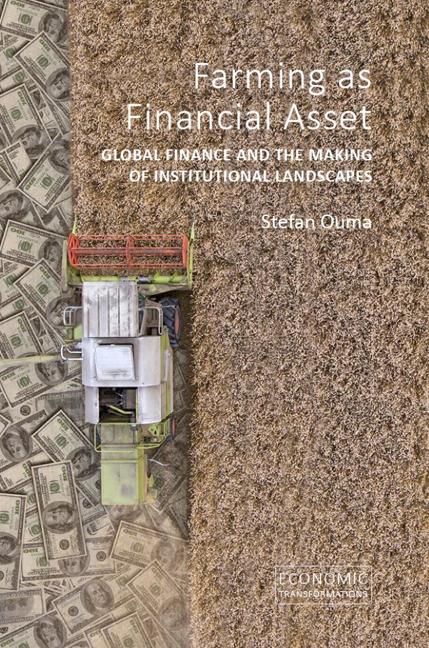Book contents
- Frontmatter
- Contents
- Preface
- Acknowledgements
- List of illustrations
- 1 Introduction
- 2 Optic: how do we study the finance– farming nexus?
- 3 History: how old is the finance– farming nexus?
- 4 Numbers: what we know (and do not know) about finance-gone-farming
- 5 States: how are foreign investments in farming regulated and accounted for?
- 6 Value(s): why has the road to “greener pastures” been so bumpy?
- 7 Delegation: what happens inside the agri-investment chain?
- 8 Grounding: what does assetization look like from below?
- 9 Radices: food futures, with or without finance as we know it?
- Epilogue
- References
- Index
6 - Value(s): why has the road to “greener pastures” been so bumpy?
- Frontmatter
- Contents
- Preface
- Acknowledgements
- List of illustrations
- 1 Introduction
- 2 Optic: how do we study the finance– farming nexus?
- 3 History: how old is the finance– farming nexus?
- 4 Numbers: what we know (and do not know) about finance-gone-farming
- 5 States: how are foreign investments in farming regulated and accounted for?
- 6 Value(s): why has the road to “greener pastures” been so bumpy?
- 7 Delegation: what happens inside the agri-investment chain?
- 8 Grounding: what does assetization look like from below?
- 9 Radices: food futures, with or without finance as we know it?
- Epilogue
- References
- Index
Summary
When entering the “Euro Finance Week” conference in Germany's financial hub Frankfurt back in November 2013, something was different. A group of 30 protestors from the Blockupy movement had organized a “Spalier der Schande” (“cordon of shame”), welcoming participants to this stable of the financial industry by reminding them of the “immorality” of their activities. Specifically, their protest accused financial institutions of being involved in “food speculation” and “land grabbing”. Deutsche Bank was one of the most prominent targets of their protest, but it was global finance more generally that attracted the ire of the protestors, as the Euro Finance Week for the first time hosted an “Executive Roundtable on Agrifinance”. The panel was a manifestation of finance's new love for all things agricultural, which had steadily developed in the wake of the financial and food price crises of 2008. As can be seen from the protest described above, not everyone has been fond of this new relationship. The demonstrators outside the Euro Finance Week are only part of a wider movement that has contested the acquisition of farmland and agricultural ventures by financial actors around the globe, particularly in regions of the Global South. Webpages such as farmlandgrab. com, the Land Matrix project (the databank recording and visualizing all global land acquisitions since 2000) and many critical news and NGO reports are indicative of this.
Activists have not been the only critics. The finance-driven land rush has also given rise to critical views on the part of academics, the media and, at times, law-makers around the globe. As we have seen in Chapter 2, most early academic interpretations have mobilized the notion of financialization to make sense of the issue. These interpretations considered in particular finance's run on farmland as yet another example of the relentless extension of financial market forces, potentially leading to the dispossession of local communities from their ancestral lands through the advancement of shareholder farming (Clapp 2014; Fairbairn 2014; Gunnoe 2014; McMichael 2012; Russi 2013).
- Type
- Chapter
- Information
- Farming as Financial AssetGlobal Finance and the Making of Institutional Landscapes, pp. 93 - 110Publisher: Agenda PublishingPrint publication year: 2020



